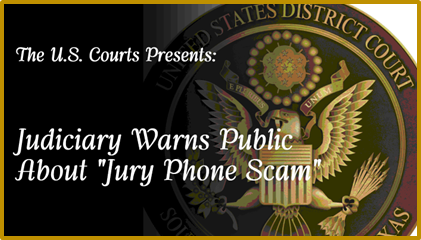 |
Juror Scam Seeks Personal DataPublished on July 31, 2014 |
|
Editor's Note: Learn more about scams targeting jurors and others doing business with the federal courts, and how to protect yourself. A juror scam email, which fraudulently seeks personal information that could aid identity theft, has been reported in at least 14 federal court districts. According to the Administrative Office of the U.S. Courts, citizens received emails claiming they had been selected for jury service and demanding that they return a form with such information as Social Security and driver’s license numbers, date of birth, cell phone number, and mother’s maiden name. According to the email, anyone who failed to provide the information would be ordered to court to explain their failure and could face fines and jail time. The email also falsely claimed that it was affiliated with eJuror, an online registration program used in about 80 U.S. court districts. The email is fraudulent and has no connection to either the federal courts or to eJuror. The Administrative Office noted that eJuror never requests that personal identification information be sent directly in an email response. Requests by courts to complete a qualification questionnaire would be initiated by formal written correspondence. Such letters tell jury participants how to access an authenticated, secure online connection. It is a federal crime to falsely represent oneself as a federal court employee. U.S. District Court officials were urged to post warnings about the scam on their public web sites, and anyone suspecting a fraudulent email or call should contact the clerk's office at their nearest district court. Anyone who responded to the email should take appropriate steps to safeguard their personal and financial information, which may include contacting the major credit bureaus. The United States District Court does not solicit personal information – social security, driver's license, or credit card numbers over the telephone or by e-mail. Call the Jury Office at (713) 250-5501 if someone asks for that kind of information. If you receive a phone call or an e-mail from someone claiming to be a court official, DO NOT give them any sensitive information. If you believe you were a victim of such a scam, you are encouraged to report the incident to your local FBI office and to the FTC. Read more: Press Release: U.S. Marshals, FBI Urge Public to Report Phone Scams, Spoofers using government phone numbers To learn more about juror scams, see this U.S. Courts web page. Contact information for courts can be found via the U.S. Courts’ court locator. Related Topics: Public Alerts |

